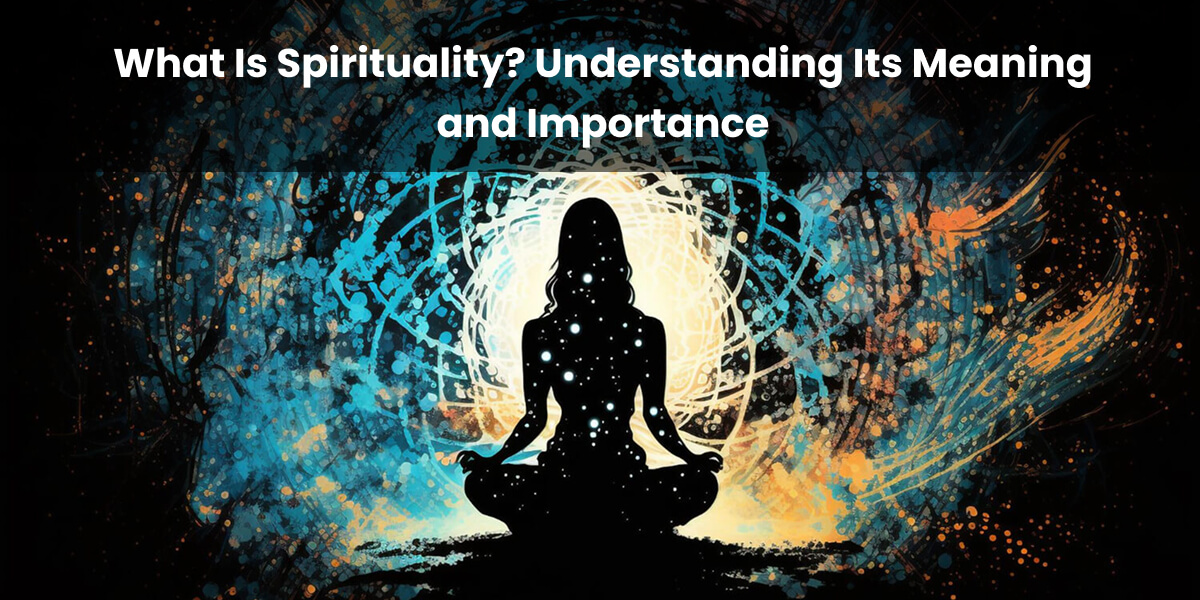Knowledge is a seek and find story. The world we live in now is rushed and all digitized where many individuals are in need to search something deeper, to feel the serenity, or simply to be needed, more than being an idea, something physical. There is where spirituality sometimes comes in providing a peaceful place within us in which we can rest.
Spirituality appears different to everyone whether this is by way of meditation, nature, prayer or through silent reflection. On a more fundamental level it is a story of meaning, of finding meaning in people, in others and in life.
What then is spirituality? Its origin is where? And how can it influence the lifestyle? Let’s explore.
What Is Spirituality?
Spirituality describes the inner process of following life bigger questions, such as Who am I? or What is my purpose? It is nothing to do with religion or rituals. Rather, it is a matter of connection, that is, connection to ourselves, to other people, to nature, or something bigger than ourselves.
To others, spiritual can be linked to faith or belief of a supreme power. In other people it may be the awe of a sunset, the moment of stillness in meditation or being overwhelmed by music or art. It has no one definition: since spirituality is highly subjective.
Fundamentally, spirituality calls upon us to take things slowly, to get connected to an inner world, and to see a purpose in daily life. It is about the life of conscious living, compassion, a sense of belonging not only in the world wherein we live but also something eternal within ourselves.
Origins and Evolution of Spiritual Thought
The spiritual life of the human has a long history, as it has a duration of thousands of years. In ancient times it was a starting point to know about mysteries of nature, stars, life and death. These are some of the sources that existed to give early people signs, symbols and meaning in their world, looking to the sky and the sun and rivers, and the forest, as well as sources of life.
With the development of societies, spiritual thought was developed as well. Various cultures formed their own ideologies and customs the meditations in the East, the philosophy in Greece, the local nativity rituals, development of religious books. Spirituality served as a passageway between the physical and the unseen as it enabled people to communicate with something that was greater than they are.
Spirituality has also been evolving with time. People nowadays are pursuing spirituality without religion in many different ways partaking of mindfulness, yoga, kindness towards others and being present. Whichever its kind, the nature is identical the search to connect, to have peace, to have a meaning.
Core Elements of Spirituality
Spirituality might appear varied to all people yet certain elements tend to characterize it. These are those characteristics and lives which can make people feel more grounded, connected, and internally satisfied.
How about some of the basic fundamentals that help to form a spiritual life:
1. Self-Awareness
Spirituality is all about self-awareness reflection as the potential to look inside of us observe our thoughts and feelings and think about who we are. It not only promotes the self-development but makes us realize what is important to us and improves inner compass.
2. Connection
Spirituality also comes with a feeling of belongingness- to nature, to the human race, to certain higher entity, or even to the universe in general. This sense of belonging can curb loneliness and motivate one to have a greater sense of life.
3. The Concept of Compassion and Kindness
Most spiritual traditions lay stress on love, compassion, and considerations. An act of kindness to others and ourselves leads to the growth of emotional well-being and stronger communities. It also promotes unity of human race.
4. Purpose and meaning
Having a spiritual life usually means one seeks or finds meaning – in job, service, creativity and relationships. The search adds meaning to everyday life and enables us to become stronger when encountering everyday problems.
5. Presence and mindfulness
Being present- now and in the fullest sense of the word, is an essential component of most spiritual practices. Mindfulness assists in calming the background noise, stress levels and connecting more with the here and now.
Importance of Spirituality in Daily Life
In an age where we are bombarded with notifications, obligations and stress, we easily overlook the need to take care of ourselves. Spirituality also leads us to things that truly count: inner peace, connectedness, and sense of balance.
It does not always require a temple or yoga mat. There are times where it is simply about taking a moment and being able to just breathe, evaluate your day, or be kind when you need kindness the least. Spirituality can go about its good work in a remarkably subtle way:
- It allows you to be Grounded.
Whenever all the things are too much also when you are in a bad day in a workplace and you have family conflict, or the amount of noise is too much spiritual practices bring you back to your core and find a stability.
- It enhances your experience of meaning.
Goals and checklists are not all about life. Spirituality will always remind you demand the question: Why do I do this? The result of such contemplation is that day-to-day activities become meaningful actions.
- It develops emotional stamina.
During tough moments, such as, loss, failure or loss of oneself; spirituality is a silent pillar. It provides you with the power to accept, heal and to move on without losing hope.
- It enhances the way you relate with other people.
Spiritual perspective causes you to be more understanding and tolerant. You are a better listener. You are more judgmental. Connections become more respectful, authentic and nurturing.
- It introduces consciousness even in little moments.
Its sitting in a chai-stall, taking a walk on a rain-showery day, watching the sunset, and the spirituality in everything teaches one to pause and look at the beauty of the present, not only in a big event.
- It promotes compassion – begin by doing good to yourself.
A lot of humans are self-critical. Spirituality encourages you to be gentler, less judgmental and less condemning; not only of other surrounding people but with yourself as well.
Best Spiritual Practices Across Cultures
Spirituality is something very personal, but the cultures, beliefs and lifestyles have been so artistically formed that people base spirituality on them. Whether it is the ancient rituals or the current mindfulness, all traditions provide the perspective of reaching inner peace and clarity.
All right, now, to some of the most potent as well as the most commonly applied spiritual practices known to humankind all over the planet, which are at the same time extremely different (if not strictly incompatible), yet in the sense in which they are intended to get a human being closer to himself/herself as well as to the surrounding world.
1. Meditation (East Asia, India, and World)
One of the spiritual practices which are well known is meditation, as it has its roots deep into the Hinduism and Buddhism religious beliefs. It is the process of soothing the mind, the breath or just watching the thoughts pass. It has today been used all over the world as a means of eliminating stress and achieving personal peace.
2. Devotion and Prayer (Sikh, Islam, Christianity)
In most religions, an act of prayer is one way of relating with God. Be it Islamic salah, Christian morning prayer or Sikh paath, practicing this is comforting, thankful and a surrender. It develops faith and brings with it purpose in hardships in life.
3. Present Awareness and Mindfulness (Buddhism, Zen, Global wellness)
Presenting the moment through mindfulness is one more spiritual gem of Zen Buddhism and of the contemporary movements of well-being. It teaches individuals to live in the present moment and non-reactively, so anxiety can be minimized and each day has a better depth.
4. Nature Connection (Native Culture, Pagan, Animism)
The nature is considered sacred in many cultures. People of the world do rituals to express respect to the earth, animals and seasons. This spiritual relationship with nature results in gratitude, balance and respect to all life.
5. Chanting and Mantras (Hindu, Buddhist and Jain)
Repeated repetition of sacred sounds or sentences, such as, Om or Buddhist chants would aid in silencing the mind and changing the energies. There is a belief that with the help of mantra, the mind is purified and it gives spiritual concentration and mantra is exercised frequently by use of prayer beads (japa).
6. Fasting and Self-Discipline (Islam, Hinduism and Christianity )
The fasting which is spiritual such as that of Ramadan, Lent or Navratri is not all about food. It teaches self-governance, forbearance and contemplation that makes people get in touch with their personalities and ideologies.
7. Acts of Service (Seva in Sikhism, Charity in Islam and Christianity)
Ministering to people is a great spiritual activity. Whether it is feeding the poor or simply helping a person in need, service gives a humbling element, a noble feeling and cohesion among individuals. It reminds us that spirituality is something not only inside, it is also the way you treat the rest of people.
How to Begin Your Spiritual Journey?
You do not need a guru, a week in the mountains, a bookshelf of books to start a spiritual journey. It all starts with sensation of curiosity, with the readiness to stop and ask yourself a few questions, such as: What is something that leaves me in peace? or what really matters to me? It is a very individual process and may change as time passes.
And here are some soft starts to spiritual uptake, a first-time around, or reconnection:
- Self-Reflections start with Self-Reflection
Take some quiet time every once in a while during the day to do a self-check up. To know yourself more inwardly you can journal about what you are thinking, feeling, or asking yourself.
- Practice Mindfulness
Be present when having a meal, when walking, or so seated. Mindfulness assists you to decelerate and be in touch with life.
- Research,Study Meditation or Breathwork
Start by doing a deep breathing or guided meditation session at 5 minutes only. It relaxes the mind and creates a sort of room with clarity and peace.
- Read spiritual books or listen to lecture
Read books or listen to podcasts or short videos about traditions you are not used to; not in order to get all the answers, but to see what reaches you.
- Nature Time
Nature is a potent spiritual healer that can make you feel anchored and at one with yourself. A stroll outside, a seat under a tree, or a rainstorm as it is falling are some of the typical cases when nature teaches you something valuable.
- The Spiritual Path of Rumi
You are not required to do what everybody is doing. Rather than be led by what people tell you is good or best, trust what gives you joy, peace or purpose, whether it is art, music, praying or stillness.
Related Blog: A Beginner’s Guide on How to Develop Spirituality
Common Myths About Spirituality
The reason a lot of people are afraid to pursue the spiritual understandings of life lies within several commonplace myths that are completely outdated. These myths present spirituality as something distant, probably stiff and even scary. However the reality? It is a lot more personal and down to earth as well as all inclusive than most people assume.
So let us bust some of the most common myths that tend to come in the way:
Myth 1: You have to be religious to be spiritual.
Reality: Spirituality and religion may intersect- however, they are not its synonyms. Being religious is not a part of any single religion. It is rather associated with an inner connection as opposed to adhering to a certain doctrine.
Myth 2: A spiritual individual should renounce everything in the world.
Reality: Spirituality is not going to the mountains or leading a life without comfort. Living with awareness means sensing what is at hand without denying life, just living in a more conscious way.
Myth 3: “To become spiritual you must spend hours meditating.”
Reality: You can still answer yourself by spending just 5 minutes of quiet time a day. It is all about the intention rather than time, there are no single rules to follow.
Myth 4: Older people are the only people who require spirituality.
Reality: And actually, the sooner you start discovering your inner world, the more whole-hearted and meaningful your life will soon become, no matter what age you are.
Myth 5: Spirituality is a synonym of: one is too serious or detached.
Reality: No, not a bit. Spirituality does not require you to deny yourself the things that make life joyful or laughter or sharing with the fellow man. It only assists in allowing you to appreciate them more fully and on purpose.
FAQs About Spirituality
And there are more questions in your mind concerning what spirituality truly is or the role of this concept in your life? These are some of the straightforward answers which can make you know more about it.
Q1. What is the difference between religion and spirituality?
Religion can be programmatic, that is, it can be defined by certain beliefs, practices and places. Spirituality is more intimate, however. It asserts your personal relationship to something bigger – be it, God or universe or even yourself.
Although religion might be the path that you need to walk on your spiritual journey, you are still the spiritual person without having to belong to a distinct religion. The two are not the same but the two can overlap.
Q2. Can you be spiritual without being religious?
Yes, absolutely. Religion is not the only system that is spiritually oriented. It can be observed either in nature, art, quietness, even when there are meaningful conversations. A great number of individuals find their inner lives and purpose of living without referring to a specific religion.
The secret is the will to do it, i.e. you want to feel connected, you want to understand something, you want to be at peace; there you have a spiritual life.
Q3. How does spirituality benefit health and well-being?
The spiritual practices, including mindfulness, prayer or reflection on self, can possibly result in a reduction of stress and an improvement of attention and emotional stability. They help people feel positive and persevere at critical times feeling more relaxed and hopeful.
Spirituality can help to support both mental and physical conditions in a long-term perspective since it helps to stay calm both inside and out and can restrain stress and anxiety.
Q4. Is spirituality the same across all cultures?
The fundamental emotions, such as connection, purpose, or peace may be generic but the cultural experience of spirituality exists in a myriad of ways and covers numerous areas. People invoke rituals, others turn to meditation, use chants, or nature-related customs.
Nevertheless, all of the cultures in the world have developed their own way to access the spiritual aspect of life.
Q5. What are some simple spiritual practices for beginners?
This does not require a big start. When you have a couple of minutes every day, pay attention to your thoughts by simply observing them. Write a gratitude list, walk or make a mindful walk, listen to relaxing music. Even too deep breathing.
The thing is that you should start in a subtle way, with what you feel natural about yourself and as you are growing, your practice should develop too.
Conclusion
Spirituality is not a place we are in, actually, it is a path on the compass of the Soul. Where you begin and whatever steps you make do not really matter as long as you come closer to peace, purpose and your true self.
The thing is you can discover spirituality in the silence, in the service, in the nature or in your ordinary thoughts, spirituality is always there. The more you learn about it, the more stable, empathetic, and relevant you start to feel yourself, as well as the rest of the world.









Post a Comment